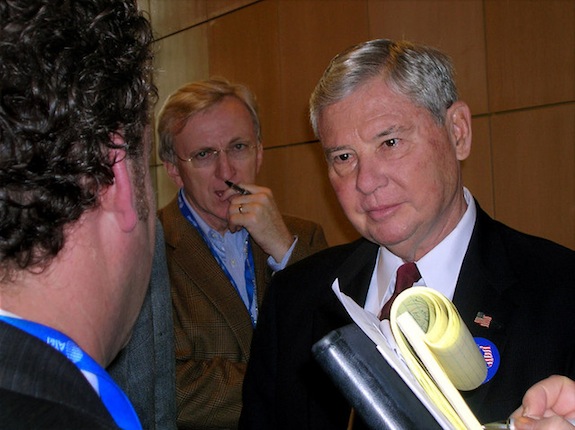
Former Senator Bob Graham called upon officials to open up investigations into foreign support for the 9/11 hijackers after reports surfaced of a Sarasota family linked to the hijackers. (Photo by Quinn deEskimo.)
By Ashley Lopez
Florida Center for Investigative Reporting
Former U.S. Senator Bob Graham called for reopening the 9/11 investigation yesterday. Graham was formerly the chair of the Senate Select Committee on Intelligence and he co-chaired the Congressional Joint Inquiry into 9/11 about a decade ago.
This is not the first time Graham asked for the investigation be re-opened. However, this time, his pleas follow a complaint filed in an U.S. District Court against the FBI and the U.S. Justice Department.
The complaint, filed by Broward Bulldog editor Dan Christensen, accuses these federal agencies of improperly withholding records of an investigation from Congress, the 9/11 Commission and the American public that show a link between a Saudi family in Sarasota and the terrorist attacks on Sept. 11, 2011.
According to a press release from Christensen:
The records are sought to determine whether the FBI uncovered evidence showing that the 9/11 hijackers were connected to the Saudis who hastily left the country in a suspicious manner just two weeks prior to the attacks, leaving behind their luxury home and personal belongings…
FBI spokesmen have said the FBI found no “credible evidence” connecting the Saudi family in Sarasota and the 9/11 hijackers, according to Bulldog editor Dan Christensen. “But it (FBI) so far has refused specific requests by various newspapers to provide details that would support that assertion,” he wrote in a letter to the FBI.
Graham wrote in an op-ed yesterday, the day of the eleventh anniversary of the 9/11 attacks, that the Bulldog’s findings were an example of the many thwarted attempts to uncover some of the connections the 9/11 hijackers had to people here in the United States.
According to Graham’s op-ed for The Huffington Post:
The FBI withheld from the Congressional Inquiry, and from the subsequent 9/11 Commission, the fact that it had investigated another potential support pod for the hijackers in Sarasota, Florida. That information became public on the tenth anniversary last year, following persistent work by Anthony Summers, co-author of The Eleventh Day, this year’s Pulitzer Prize for History finalist, and his colleague Dan Christensen, an investigative journalist in South Florida with BrowardBulldog.org.
In the Sarasota case, law enforcement officials suspected that several hijackers, including their leader Mohamed Atta, repeatedly visited the home of a Saudi couple in a suburban gated community. Their visits, sources who were involved at the time say, were on record — the license plates of vehicles they used to enter the community had been automatically photographed. The Saudi couple abruptly left their posh home, bound for Saudi Arabia, about two weeks before 9/11. The husband and his father-in-law were apparently on a watch list at the FBI and a U.S. agency involved in tracking terrorist funds was interested in both men even before 9/11.
When the Sarasota case erupted in September of 2011, the FBI issued two public statements, each of which declared there had been a full investigation of the alleged relationship between hijackers and persons in Sarasota; that investigation determined there was no such relationship; and that the Congressional Joint Inquiry and the 9/11 Commission had been informed.
Through personal knowledge, interviews and files which were made available it was found that these public statements were untrue.
In July of this year, the Senate Permanent Subcommittee on Investigations, Committee on Homeland Security, issued a 330-page report faulting banking giant HSBC for ignoring the ties to terrorist financing of Al Rajhi Bank, Saudi Arabia’s largest private bank. The report states that after the 9/11 attacks, “evidence began to emerge that Al Rajhi Bank and some of its owners had links to organizations associated with financing terrorism, including that one of the bank’s founders was an early financial benefactor of al Qaeda.” This individual was identified in the report as being part of Osama bin-Laden’s “Golden Chain” of al-Qaeda financiers.
Other information indicating that there was a Saudi role has come from the determined litigation by survivors of 9/11, the families of the dead and property insurers. A U.S. report, disclosed only after a FOIA lawsuit, hints at deeper institutional links between the Kingdom and al-Qaeda. It states that the Saudi charity, International Islamic Relief Organization’s (IIRO), “support for terrorist organizations began in the early 1990s and continued through at least the first half of 2006” and linked a Saudi IIRO official to Khalid Sheikh Mohammed.
Graham wrote that Saudis have been able to dodge lawsuits from the families of 9/11 victims because they receive “sovereign immunity” here.
He also said little has been explained to the public about the extent of support the 9/11 hijackers received. In order to find that out, he wrote, the president needs to reopen investigations into foreign support for the 9/11 hijackers. He wrote that these investigations should include a thorough look into various cities — including Delray Beach, where many of the hijackers spent time.
He also suggested the sovereign immunity law shielding foreigners from legal repercussions be changed. In fact, he said there is a bipartisan bill locked up in Congress that does just that.
Finally, Graham wrote that many of the classified documents that contain relevant information need to be declassified. He said that the “declassification must include the 28-page chapter that has been censored from the report of the Congressional Joint Inquiry, as well as the reports cited in the notes of the 9/11 Commission’s Final Report concerning al-Qaeda’s financial and logistical support network.”
